
19th Century Antique Walking Stick with Yellow Gold Top
An antique walking stick with high carat yellow gold top, Malacca cane and brass ferrule, 19th century, 83 cm high

Antique Walking Stick with Carved Ivory Handle and Silver Collar
An antique walking stick with carved ivory handle, embossed silver collar, Malacca cane shaft and brass ferrule, 85 cm high

Antique Walking Stick with Carved Horn Handle and Malacca Shaft
An antique walking stick with carved horn handle, Malacca cane shaft and brass ferrule, 19th/20th century, 91 cm high

19th Century Antique Walking Stick with Carved Bird's Head Handle
An antique walking stick with carved horn bird's head handle, cane shaft and copper ferrule, 19th century, 84 cm high
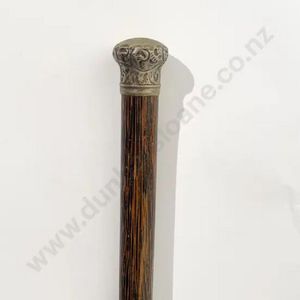
Late Victorian walking cane with silverplate top, elegant and functional
Late Victorian walking cane with silverplate top, late Victorian walking cane with silverplate top

Victorian Walking Cane: Carved Ivory Monkeys Hear, Speak, See
Late Victorian ebonised walking cane with carved ivory top, in the form of hear no evil, speak no evil, see no evil monkeys
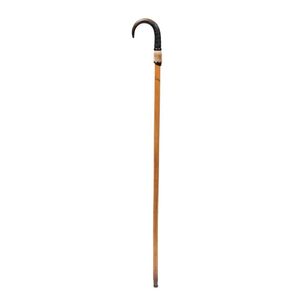
Swiss Alpine Walking Cane with Chamois Horn Handle, 20th Century
A souvenir Swiss Alpine walking cane with a Chamois horn handle, early 20th century, from 'Luzern', the cane with a horn handle and faux hoof mount, 81 cm long
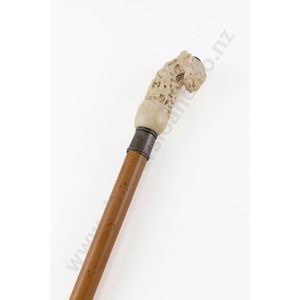
Late 19th century walking cane with Indonesian ivory kris handle
Late 19th century walking cane with an Indonesian ivory kris handle, 95 cm length
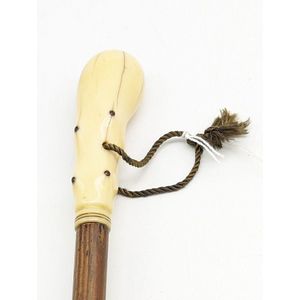
Ivory-handled wooden walking stick with gold tip, 19th century
19th century walking stick, wooden cane with ivory handle inlaid with dotted detail, gold tipped end terminating with ferrule
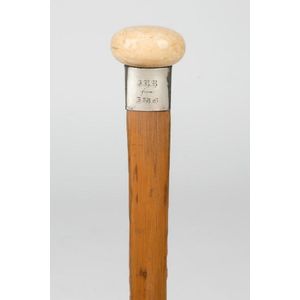
19th Century Ivory Handle Walking Stick with Silver Collar
An antique walking stick with turned ivory handle, silver collar, cane shaft and brass ferrule, 19th century, 90 cm high

19th Century Whisky Cane with Hidden Glass Tube
Whisky cane antique walking stick with concealed glass whisky tube and cork stopper, hidden under a silver cap, with ebonized shaft and brass ferrule, 19th century, 86 cm high
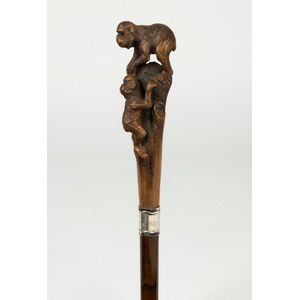
19th Century Monkey Handle Walking Stick with Silver Collar
An antique walking stick with carved boxwood monkey handle, silver collar, cane shaft and brass ferrule, 19th century, 88.5 cm high
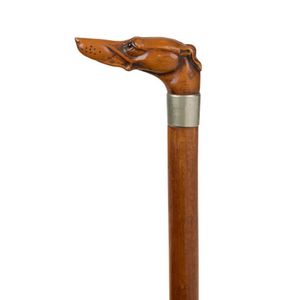
19th Century Boxwood Dog Head Walking Stick with Silver Collar
An antique walking stick with carved boxwood dog's head handle, silver plated collar, Malacca cane shaft and brass ferrule, 19th century, 89 cm high
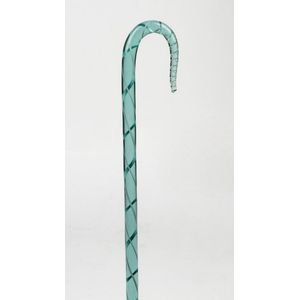
19th Century Nailsea Antique English Glass Walking Cane (98cm)
Nailsea antique English glass walking cane, 19th century, 98 cm high
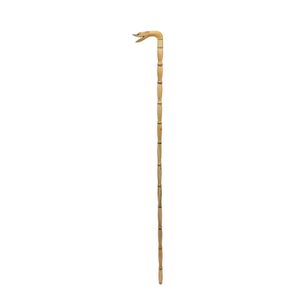
19th Century Serpent Head Whalebone Walking Stick
An antique whalebone walking stick with a serpent head handle, 19th century, the cane comprising a series of gently swollen sections replicating cane, the serpent head with carved features and a single tooth, 74 cm long
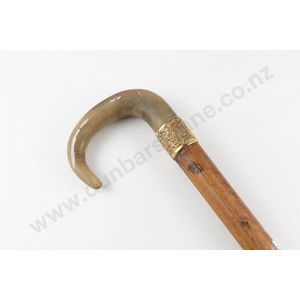
Victorian Gold-Plated Malacca Cane with Horn Handle
Victorian walking stick, malacca cane with embossed 18ct gold plated collar and horn handle
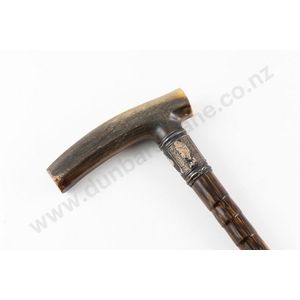
Victorian Bamboo Cane: Sterling Silver Collar & Horn Handle
Victorian walking stick, bamboo cane with sterling silver collar and faceted horn handle

Victorian Sugar Spiral Glass Walking Cane - 113 cm
Victorian hand blown glass walking cane, spiral shaft filled with coloured sugar 113 cm

Spiral Sweet-filled Victorian Glass Walking Cane - 78cm
Victorian hand blown glass walking cane, spiral shaft filled with sweets 78 cm

Engraved Edwardian Walking Cane, 1901
Edwardian wooden walking cane with knob handle, and engraved dedication dated 1901, length 80 cm
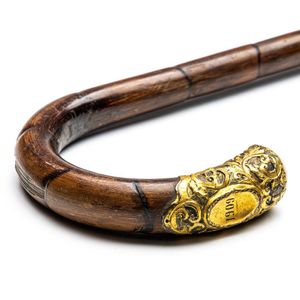
1909 Gold Plated Walking Stick with Cane Handle
An early cane and gold plated walking stick, marked 1909, height 91 cm
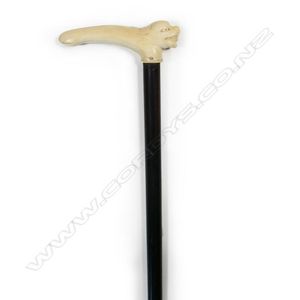
Mythical Beast Ivory Handle Walking Cane
A vintage ebony walking cane, the ivory handle carved with a mythical beast to one end, brass ferule. Length 90 cm.
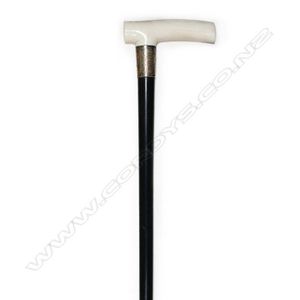
Ebonised Walking Cane with Ivory Handle and Silver Collar
An early 1900s walking cane, ebonised shaft, ivory handle and sterling silver monogrammed collar, Birmingham 1916. Length 91 cm.
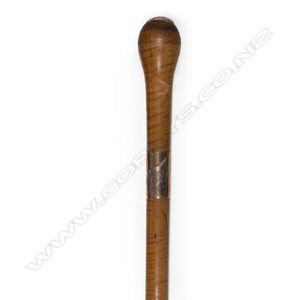
Rose Gold Presentation Walking Cane with Chatoyancy Effect
A 1900 New Zealand timber walking cane, the shaft with chatoyancy effect, a rose gold presentation collar from the Stewards of the Northern Steamship Co. and with rose gold shield to the top of handle. Length 95 cm.
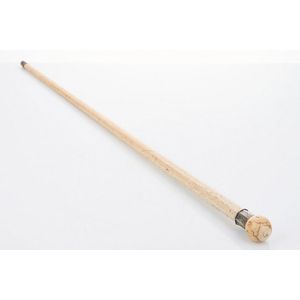
Victorian Whalebone Walking Cane with Ivory Handle and Silver Mount
Victorian whalebone walking cane, late 19th century, marine ivory ball handle and silver mount engraved with flower, on a bone shaft, height 89.5 cm

Hare Head Wooden Walking Cane with Glass Eyes
Hare head walking cane, carved wooden huon pine cane with handle modelled as hare head with life like characteristics and glass eyes, length 90 cm

Carved Ivory Skull Walking Cane Handle
A late 19th century carved ivory skull walking cane handle, finely detailed, internal thread to base. Length 4 cm.
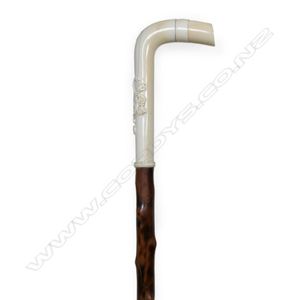
Ivory handle walking cane with lyre decoration
A 19th century walking cane, the ivory handle decorated with a lyre with vine entwined to the base, horn ferrule, height 81.5 cm
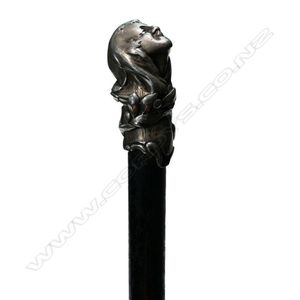
Art Nouveau Maiden Walking Cane
An early 1900s silver topped walking cane, the silver handle in the form of an Art Nouveau maiden with a berry vine entwined in her hair, length 80 cm.

Antique Tortoiseshell Walking Cane - 94.5 cm
An antique tortoiseshell covered walking cane, length 94.5 cm
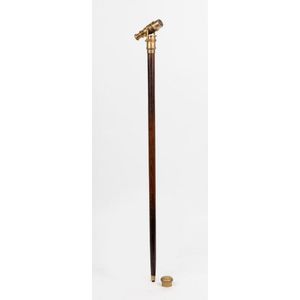
Nautical Walking Cane with Brass Telescope and Sliding Shaft
An antique brass mounted nautical telescopic walking cane, with sliding shaft mechanism and screw turban top, 94 cm long

Ivory and Silver Walking Cane with Gilt Top
A late 19th century ivory and silver gilt walking cane with gilt silver top, length 94 cm
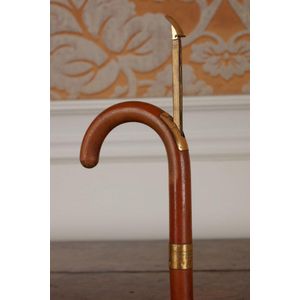
Gilt-mounted Horse Measuring Stick and Cane
A rare gilt-metal mounted horse measuring stick and cane, inscribed Sir Mortimer Sinclair KBE Milton Hill, Berks., 95 cm, long
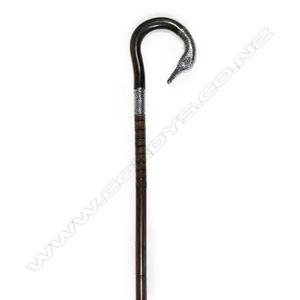
Silver Swan Head Walking Cane, 1910
A lady's walking cane, with silver swan's head handle the conforming silver ferrule with London hallmarks for 1910, length 82 cm.

Sterling Silver Walking Cane with Horn Handle
George V silver collar bone handle walking cane sterling silver collar hallmarked for Birmingham 1916, with horn handle to wooden walking cane, length 90 cm.

Snake Vertebrae Walking Cane with Carved Handle
Vintage vertebrae constructed walking cane walking cane constructed of snake vertebrae, with carved wood handle, length 85 cm

British East India Cane with Sir Jeffrey Hillpig-Smyth Marking
Jeffrey Hillpig-Smyth British East India cane marked on brass plate 'Sir Jefferey Hillpig-Smyth 1941 British East India,' wooden walking cane length 92 cm

Briar Wood Walking Cane with Natural Form Handle
Natural form Briar wood walking cane natural form handle to briar wood cane, length 87 cm

Late 19th Century Silver-Plated Walking Stick
A silver-plated topped cane walking stick, late 19th century the fiddleback blackwood cane with good patina, a shaped silver-plated pommel handle with a frieze and floral motifs ; no marks but with engraved initials and date, 1889. Length 88 cm
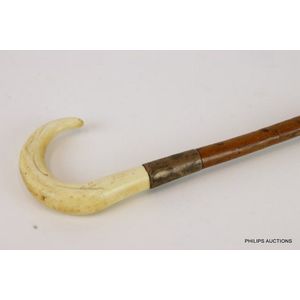
Ivory and Silver Bamboo Walking Cane
An ivory and silver topped bamboo walking cane. The slightly tapering cane, with sterling silver collar rubbed hallmarks, brass capped to the base. Length 91 cm

1875 Gold Quartz Walking Cane with Inscription
American gold rush 14k California gold quartz walking cane, with presentation inscription, to our beloved father Michael Lyons, from Catharine Cornelious, San Francisco, May 1875, Dented on side end of handle. Length 94 cm
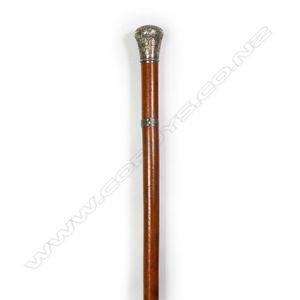
Eastern Silver & Malacca Cane Walking Stick, c.1900
A c.1900 Eastern silver and Malacca cane walking stick, possibly Chinese, the large silver knob handle embossed with rural village scene and figure, engraved 'Compliments of C & M October 1907', a belt with buckle mount below. Length 93 cm.

Edwardian Silver Mounted Briar Walking Cane - 1909 Engraved
Edwardian silver mounted briar walking cane, silver mount to handle engraved for 1909, to polished briar cane, length 80 cm
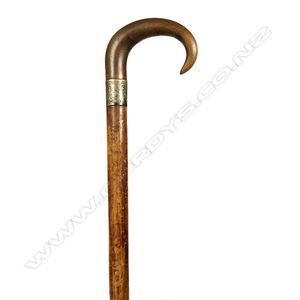
Horn Handled Malacca Walking Stick
A c1900 horn handled walking stick, the Malacca cane tapered shaft with engraved silver plate ferrule and tapered curved fibrous horn handle. Length 85.5 cm.
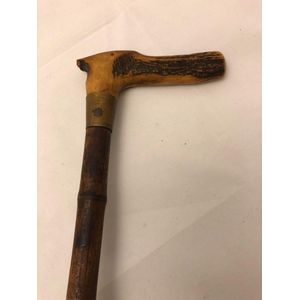
Ashford Walking Stick with Antler Handle
Early 20th century Ashford walking stick, marked 'Ashford - maker to the Queen' to brass collar, featuring a bamboo cane with antler handle, total length 94 cm
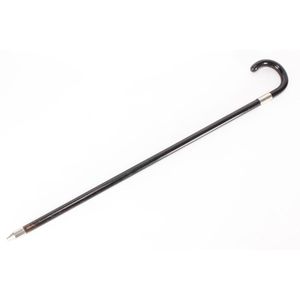
Camera tripod walking cane with crooked handle
Early 20th century camera tripod walking cane, marked Ica.Akt-Ges Dresden, with crooked handle and silver collar and base, the shaft opening into a camera tripod, in an ebonised finish

Copper Thornwood Walking Stick with Snuff and Flask
A copper mounted thornwood walking stick with a snuff compartment and spirit flask segment, together with another cane and walking stick, the largest 89 cm long
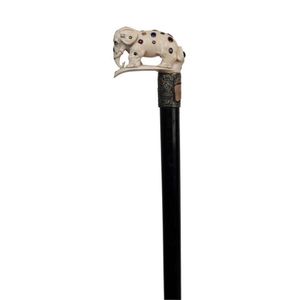
Ivory Elephant Walking Cane with Semi-Precious Gem Set Handle
A semi-precious gem set carved ivory elephant handled walking cane, Indian, late 19th century, the stick ebonised with a gilded plate engraved 'D. Packett Moulden', 92 cm

Nubian Handle Walking Cane, 19th Century
A silver mounted walking cane with a bronzed Nubian handle, 19th century, engraved monogram AD, 92 cm long
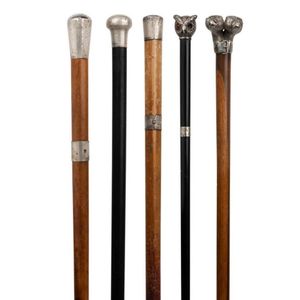
Antique Silver Handled Walking Canes Collection
A collection of five silver handled walking canes, 19th century and later, one decorated with two dog heads and a buckle, one of an owl, one marked London, 1909 by J Howell & Co and one marked London 1885, the longest 92 cm
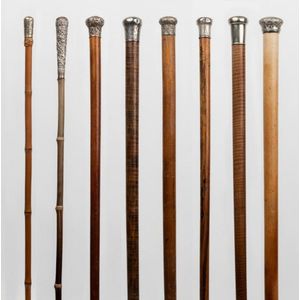
Collection of Inscribed Sterling Silver Walking Canes
A collection of sterling silver pommel handled walking canes with various inscriptions, including one by John Henry Rawlings, London, 1889, comprising eight pieces, the longest cane 93 cm long

Ivory and Tortoiseshell Walking Cane with Indian Knopped Handle
A faceted ivory and tortoiseshell walking cane, topped with with an Indian ivory knopped handle

Collection of 15 Unique Walking Sticks and Canes
A collection of walking sticks and canes, including a silver mounted 'Bohemian Club Reward' walking stick, and specimens of fiddleblack blackwood and macassar ebony, comprising fifteen pieces, the longest 93 cm

Bent Wood Walking Sticks and Canes Collection
A collection of bent wood walking sticks and walking canes, including a silver mounted horn handled walking cane, comprising fifteen pieces, the longest 92 cm
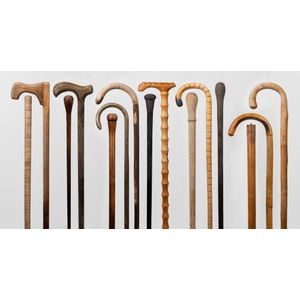
Carved Wood Walking Sticks and Canes (9 words)
A collection of carved wood walking sticks and canes, comprising fifteen pieces, the longest 97 cm
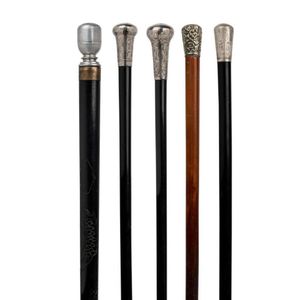
Silver and Metal Capped Walking Canes Collection
A collection of five silver and metal capped walking canes, first half 20th century, comprising two silver topped walking canes with scrolled decoration, London, 190, one London, 1929 by Henry Thomas & Co, and three other metal topped canes, the largest…
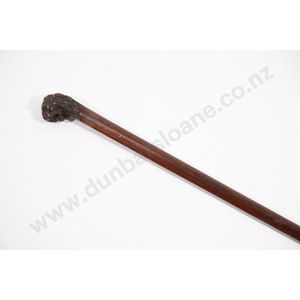
Victorian Lion Head Mahogany Walking Cane
Victorian mahogany walking cane with carved lions head Pommel with unusual flattened shaft, 88 cm length

African Mixed Material Ceremonial Walking Cane
An African mixed material hand made ceremonial walking cane, length 94 cm inc wood, warthog bone/tusk and gemsbok horn,

Art Nouveau Walking Cane with Female Handle and Pencil
Art Nouveau walking cane the s/p handle formed as a sinuous female form, the tapering wooden handle in 3 screw in sections, the central section with a propelling pencil (faults)

Silver Topped Lady's Walking Cane from Sydney
Early Australian lady's silver topped walking cane silver topped cap of a woman's figure, with engraving: 'Park Street, Sydney' length 88 cm. No makers mark, inscribed T. Teleford Priora 48 & 50 Park St Sydney.

Silver Walking Canes with Parrot Handle & Birmingham Hallmark
Two silver mounted walking canes, 19th century and later, one with a sterling silver top hallmarked Birmingham 1898, the other with a handle modelled as a silvered parrot, the longest cane 92 cm
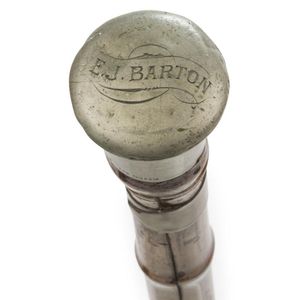
Antique Horse Measuring Cane and Riding Crops
Cane c.1890 Ashford, Maker to the Queen walking stick cum horse measuring rule with metal handle engraved 'E.J. Barton', the handle extends to reveal a ruler for measuring the height of horses, with scales in hands, inches & metric; also two riding crops.…

Beech Sword Stick Cane with Etched Blade
A sword stick cane, beech enclosing an etched single edged blade with turned beech handle. Length 95 cm
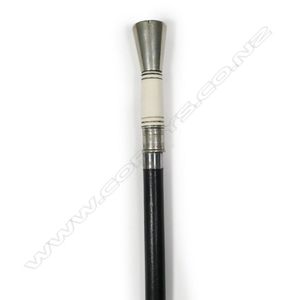
Black leather sword cane with chromed blade
A sword stick cane, black leather covered cane, with chromed blade, the bone handle with silver plated ferrule and pommel. Length 99 cm

Embossed Silver Capped Ebonised Walking Cane
Antique silver capped ebonised walking cane decorative embossed silver cap marked 925, to ebonised cane, length 98 cm
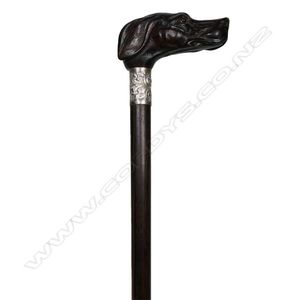
Carved Dog Head Walking Cane with Glass Eyes
A vintage carved dog head handled walking cane, on a rosewood shaft with silverplate collar, the dog with glass eyes.

Swaine & Adeney London Walking Cane with Horse Gauge
Rare Swaine & Adeney London walking cane with included horse measurement gauge, measured in hands on internal extendable wooden rod, with an included brass measuring balance, all included within a cane walking stick, length 94 cm.
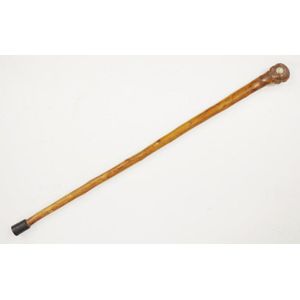
Scottish Highland Military Cane with Royal Emblem - 88cm
Antique Scottish highland military walking cane with silvered emblem of the Royal Regiment Scotland presentation cane, length 88 cm

Ivory Handle Rose Gold Plated Walking Stick
An antique walking stick with carved ivory handle, rose gold plated collar, cane shaft and ivory ferrule, 19th century, 88 cm high
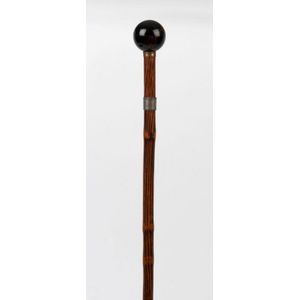
Tiger Eye Walking Stick with Silver and Gold Accents
A walking stick with spherical tiger eye handle, silver and gold plated collars, cane shaft and metal ferrule, 19th century, 83 cm high
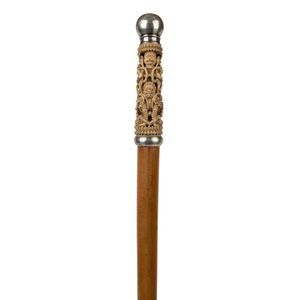
19th Century Walking Stick with Ivory Handle and Silver Top
A walking stick with an eastern carved marine ivory handle, English sterling silver top, cane shaft and brass ferrule, 19th century, 98 cm high

Whalebone Cane with Mother-of-Pearl Inlay
A 19th century whalebone walking cane, plain tapered form, inlaid at the handle with diamonds of black lip mother-of-pearl shell. Length 76.5 cm. Provenance: The H.N.E Sheppard Estate Collection.

Victorian Marine Ivory Walking Cane with Rosewood Bands
Victorian marine ivory walking cane, with two rosewood bands below the pommel, 78 cm length
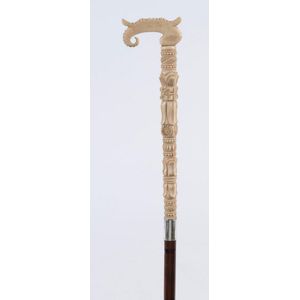
Ivory and Silver Walking Cane
A walking cane, carved ivory handle with silver collar, cane shaft and brass ferrule, 19th century, 89 cm high

Native American Walking Stick with Carved Antler Handle
An American Indian themed walking stick, carved deer antler handle, silver collar, Malacca cane shaft and brass ferrule, 19th/20th century, 93 cm high
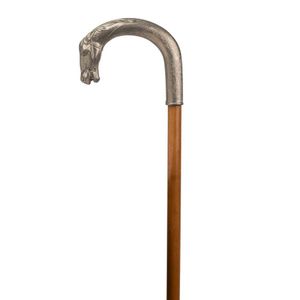
19th Century Silver Horse Head Walking Stick
A walking stick, silver horse head handle with Malacca cane shaft and metal ferrule, 19th century, 93 cm high
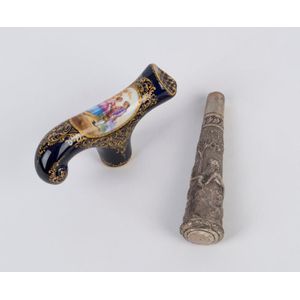
19th Century Sevres Porcelain and Silver Walking Stick Handles
Sevres French porcelain walking stick handle and a silver walking cane handle, 19th century, the silver handle 11 cm high
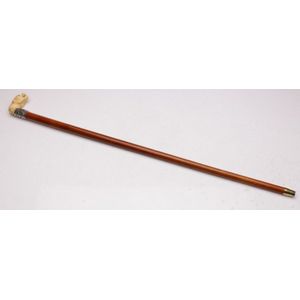
Ivory and Silver Dog Handle Walking Cane
An early 20th century ivory and silver handle walking cane, length 82 cm silver metal no hallmarks found, dog handle with glass eyes
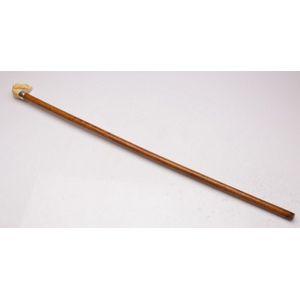
Silver and Ivory Dog Head Walking Cane
An early 20th century silver and ivory English walking cane with dog head hand set with glass eyes, silver collar with marks rubbed, length 86 cm, missing bottom tip

Carved Pug Walking Cane End
Walking cane end late 19th century carved wooden, Pug with articulated mouth, length 15 cm

1913 London Hallmarked Sterling Silver Walking Cane
Sterling silver capped walking cane, hallmarked London, 1913, Mappin & Webb, the rounded handle set on a tapered shaft, total length 94.5 cm
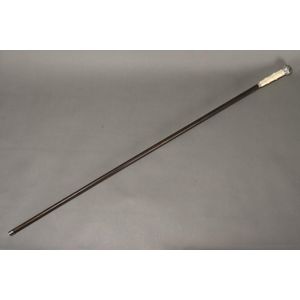
Acanthus Motif Sterling Silver Walking Cane
Sterling silver capped walking cane, hallmarked, of spherical form embossed with acanthus motifs, set above an ivory collar, total length 99 cm

Edwardian Walking Stick Sword with Silver Fittings and Engraving
Walking stick sword an Edwardian gentlemen's rattan cane walking stick with silver fittings. Maker Henry Tracy & Sons London assayed 1921. Having engraving (Leb 1927). Blade showing stamps France 5.

Ebonised Walking Cane with Sterling Silver Mounts
Victorian ebonised walking cane the handle with sterling silver mounts.
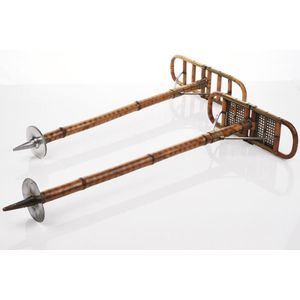
French Bamboo Shooting Sticks with Brass Hardware (10 words)
Two French bamboo shooting sticks, early 20th century, with brass hardware, one with cane seat (2), height 88 cm, 92 cm. Provenance: The Estate of Martyn Cook, Sydney
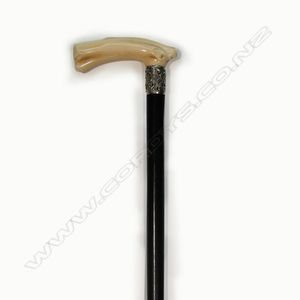
Malacca Cane with Ivory Handle and Silver Collar
A 19th century Malacca walking cane, with marine ivory handle and silver collar.
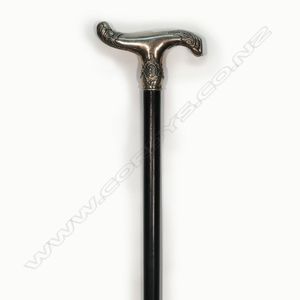
Malacca Cane with Art Nouveau Silver Handle
A 19th century Malacca walking cane, with silver Art Nouveau handle, stamped 800.

Antique Sterling Silver Walking Cane Handle - London 1917
Vintage Sterling silver handle walking cane handle hallmarked London circa 1917, marks rubbed, maker Henry Tracy and Sons, handle worn, length 87 cm

Vintage Wooden Walking Cane with Bun-Topped Handle
Vintage wooden walking cane with 'bun' topped handle, length 87 cm

Ivory Carved Stag Cane - Vintage Forest Scene Handle
Vintage carved ivory topped walking cane with carved ivory handle, depicting stags in a forest scene, to wooden cane, length 87 cm
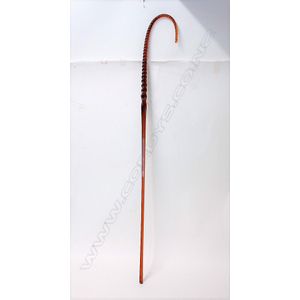
Victorian Amber Glass Walking Cane with Twisted Handle
A Victorian amber glass walking cane, the square section shaft tapering to a long twisted curved handle. Length 105 cm.

Ivory and Silver Handled Malacca Cane Walking Stick
A c.1900 ivory and silver handled malacca cane walking stick, the tapered handle with raised knobbly effect, scroll decorated silver band and cap end showing some distress. Hallmarked London 1891. Length 90 cm.
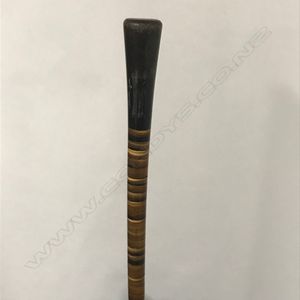
Horn Disc Walking Cane
A slender walking cane of variously toned horn tapering discs, stacked on a steel shaft, terminating in a dark horn finial. Length 86 cm
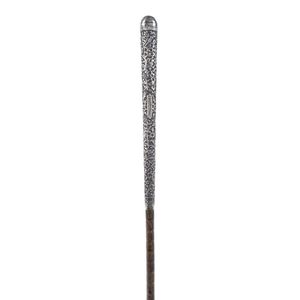
Malacca Cane Walking Stick with Indian Kutch Silver Handle
A fine walking stick with Malacca cane shaft and Indian Kutch silver handle, 19th century, 101 cm high
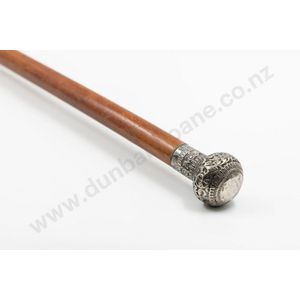

 Loading more...
Loading more...